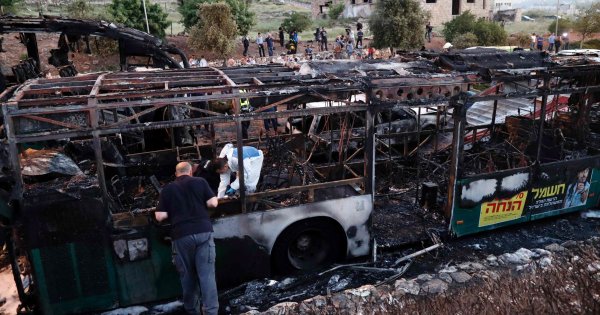Through the Flames… a Glimpse at Israel’s Future
Many buses exploded here in a dark 10-year period. Between the suicide attack on Tel Aviv’s Dizengoff Street in October 1994 and the double suicide attack in Be’er Sheva in August 2004, more than 20 buses went up in flames. The repeated terror attacks in Jerusalem, Tel Aviv, Haifa, Afula, Yagur, Megiddo, Meron, Karkur, Wadi Ara and the Galilee rocked Israel violently.
Each horrific event made clear the barbaric enemy we faced. Each war crime proved what would happen to us if for a moment the sword dropped from our hand. Each suicide attack was another nail in the coffin of the old peace process, which instead of bringing calm brought the post-Oslo terror wave, the post-Camp David terror surge and the loss of hope. The way to the two-state solution was blocked by around 25 burned-out, shattered buses in which more than 300 Israelis were killed.
The attack this week on the No. 12 bus in Jerusalem appeared less harsh than the attacks of the ‘90s and the next decade. This time the bomb was improvised and the explosives weren’t standard issue, so there was no mass killing. But the message in the two buses that burned Monday evening on Moshe Baram Street was clear: The future is now. Are you afraid of Hamas, Al-Qaida and the Islamic State? Israel knows how to strike malicious organizations outside its borders, but it will be exposed and vulnerable when Hamas, Al-Qaida or the Islamic State take root in the West Bank’s densely populated areas and start setting fire to Israel from within.
Want power? A state without borders that dominates a nation that objects to the state’s very existence is a state getting dangerously weaker. Want security? Ruling over millions of oppressed, frustrated Palestinians who hate us is destined to destroy our national security and undermine our personal security. There’s no way the one-state situation will be one of peace and calm. The one-state situation harbors disaster. In the short term, there’s no problem. The army is strong, the Shin Bet security service is ingenious and the sophisticated mechanisms we’ve created to normalize an abnormal reality still work well. The medium term isn’t clear. The peace process’ collapse and the Palestinian Authority’s decline are bound to change the West Bank in a way we can’t predict.
But the long term could be seen clearly in the fire that engulfed the bus and in the terror attack’s 20 casualties. And what could be seen was Kosovo – a war of community against community, village against village, neighborhood against neighborhood. A war of the oppressed against the scared and the despairing against the petrified. An all-out war of neighbors who hate each other that sooner or later will turn both the Israelis’ and Palestinians’ lives into hell. To this day the left hasn’t found a convincing way to prevent the recurrence of the exploding buses of 1994 to 2004. That’s why the left has evaporated. The center-left won’t revive, and there will be no return to the path of peace until we recognize the trauma of those buses and the justified fears they raised.
But now Benjamin Netanyahu, Naftali Bennett, Likud and the whole right wing face a similar problem. The nationalist right has ruled here for seven years. The nationalist right has turned the Jewish state into a bleeding, binational pulp. So the nationalist right bears responsibility. The next election will be a choice between the right wing and security – between West Bank settlements and Zionism, between the Greater Land of Israel of blood, fire and smoke and a strong, sovereign Israeli state.
Ari Shavit, Haaretz April 21, 2016

